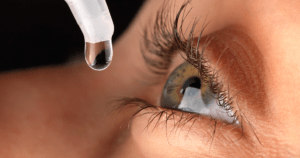Ten cases of retinoblastoma recorded in Ghana in two years
 The Rotary Club of Accra-La East under its free National Eye Screening Project has picked up 10 cases of retinoblastoma in children between the ages of zero to five in some regions and districts across the country.
The Rotary Club of Accra-La East under its free National Eye Screening Project has picked up 10 cases of retinoblastoma in children between the ages of zero to five in some regions and districts across the country.
The children have been referred to various teaching hospitals for attention.
Retinoblastoma (RB) is a cancer that affects children in their first five years and starts in the retina, the very back part of the eye.
It is the most common primary ocular tumor in childhood and is a significant cause of childhood blindness.
Ms Julia Asante-Anim, the President of Rotary Club Accra-La East, said this at a ceremony organised by her outfit in collaboration with Dortmund Germany to end the two-year National Eye Screening Project and to officially handover Arclight’s to the GHS to aid eye screening exercises for retinoblastoma across the country.
She said the number of cases picked up was an indication of how effective the project had been because retinoblastoma was a rare disease, saying even one occurrence per 100,000 live births was dangerous and should be a concern.
The National Eye Screening Project launched in 2021 was aimed at screening and treating children aged zero to five for all kinds of eye diseases.
The eye screening, which was done free for all children across the country, was in partnership with Ghana Health Service (GHS), the Korle- Bu Teaching Hospital, and the University of Ghana Medical School.
The two-year project sought to identify and determine the extent of eye diseases in children under five and prevent them from becoming fatal.
The project donated 1,000 Arclights (the primary equipment for detecting Retinoblastoma) to GHS, with additional 200 imported for distribution.
It trained 172 healthcare workers as master trainers and examiners, trained 815 healthcare workers by master trainers to carry out the examinations in selected districts and municipalities.
A total of 16,668 infants and children were successfully tested throughout the period, 685 children and infants were referred within the test areas for normal eye issues, and 130 children and infants were referred to regional hospitals for suspected cases of retinoblastoma and other major eye diseases.
Ms Asante-Anim speaking on the vision of Rotary said they had secured additional funding to extend the project.
Rotary would be undertaking three health projects next year, which include providing solar vaccine shelters for all CHPS compounds, a special focus on mental health, and offering 50 free heart surgeries for children, who would be flown out of the country to India.
Professor Vera A. Essuman, Paediatric Ophthalmologist and Head of the Eye Department, Korle-Bu Teaching Hospital and Department of Surgery, University of Ghana Medical School, commended Rotary for the initiative, adding that for five years, they had been trying to establish a comprehensive and sustainable national strategy for retinoblastoma management in Ghana.
She said a baseline national survey on retinoblastoma had shown that about 20 per cent of children affected with the disease were alive and continuing treatment with an 18.4 per cent mortality rate.
Prof Essuman indicated that the annual incidence of RB was 4.68 per 100, 000 live births and about 56.4 per cent of patients were unknown or abandoned treatment.
She said despite the gains made with the project the country needed to improve medical care, which required capacity building.
She called for more resources, both human and equipmen to enable the country to deal with any type of eye condition, which affected children.
Dr Lawrence Ofori-Boadu, the Acting Director of the Institutional Care Division GHS, expressed appreciation to the partners of the projects for their support throughout the period.
He said the Arclights came at the right time and would empower community health nurses to help pick up such cases early to prevent blindness among children.
Source: GNA
